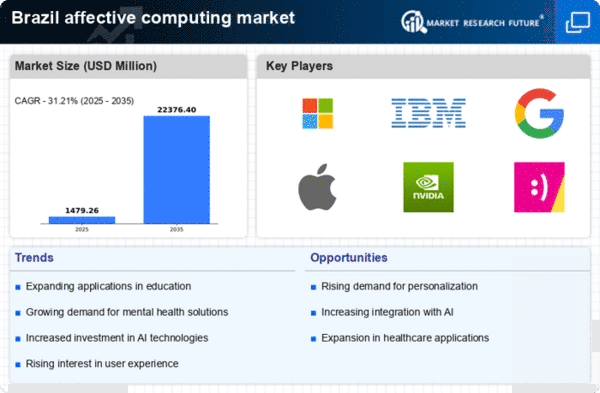Technological Advancements in AI
The rapid evolution of artificial intelligence (AI) technologies is a primary driver for the affective computing market in Brazil. Innovations in machine learning and natural language processing enable systems to better understand and interpret human emotions. This capability is particularly valuable in sectors such as customer service and mental health, where emotional insights can enhance user experiences. The Brazilian market is witnessing a surge in AI investments, with projections indicating a growth rate of approximately 30% annually. As companies increasingly adopt AI-driven solutions, the demand for affective computing applications is likely to rise, fostering a more emotionally aware digital environment.
Expansion of E-commerce Platforms
The rapid expansion of e-commerce platforms in Brazil is creating new opportunities for the affective computing market. As online shopping becomes increasingly popular, retailers are seeking ways to enhance customer engagement and satisfaction. Affective computing technologies can analyze customer emotions during the shopping experience, allowing businesses to tailor their offerings and improve service quality. Recent data suggests that e-commerce sales in Brazil are projected to reach $30 billion by 2026, indicating a robust market for innovative solutions. This growth in e-commerce is likely to drive the adoption of affective computing technologies, as companies aim to differentiate themselves in a competitive landscape.
Increased Focus on Mental Health Solutions
The rising awareness of mental health issues in Brazil is driving the demand for affective computing solutions. With a significant portion of the population experiencing mental health challenges, there is a pressing need for tools that can assist in emotional well-being. Affective computing technologies can provide valuable insights into emotional states, enabling better support and intervention strategies. The Brazilian government has also recognized the importance of mental health, allocating resources to improve access to mental health services. This focus on mental health is likely to propel the growth of the affective computing market, as stakeholders seek innovative solutions to address these challenges.
Growing Demand for Personalized Experiences
In Brazil, there is a notable shift towards personalized user experiences across various industries, which significantly impacts the affective computing market. Consumers are increasingly expecting tailored interactions, whether in retail, entertainment, or online services. This trend is supported by data indicating that 70% of Brazilian consumers prefer brands that offer personalized experiences. As businesses strive to meet these expectations, they are turning to affective computing technologies to analyze emotional responses and preferences. This growing demand for personalization is likely to drive innovation and investment in affective computing solutions, enhancing customer satisfaction and loyalty.
Government Initiatives Supporting Innovation
Brazilian government initiatives aimed at fostering technological innovation are significantly influencing the affective computing market. Programs designed to support research and development in AI and related fields are encouraging startups and established companies to explore affective computing applications. The government has allocated substantial funding to promote digital transformation across various sectors, which includes the integration of affective computing technologies. This supportive environment is likely to stimulate growth in the market, as businesses leverage government resources to develop and implement innovative solutions that address emotional intelligence in user interactions.
















